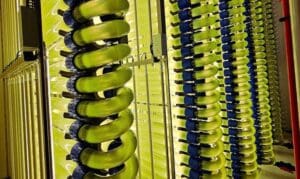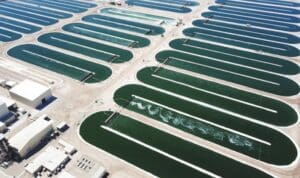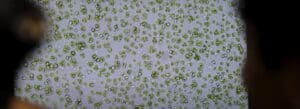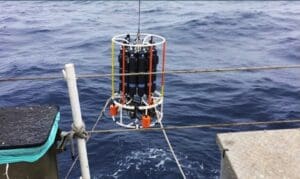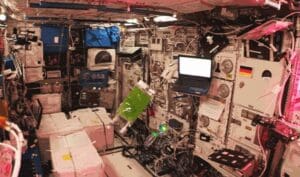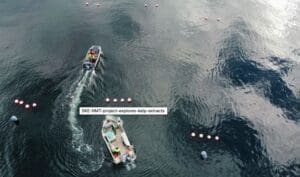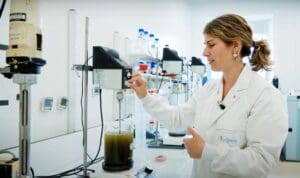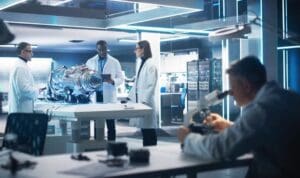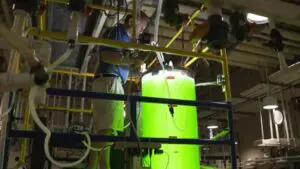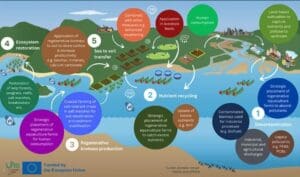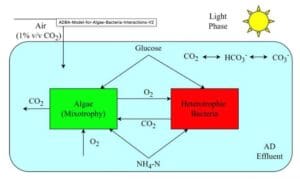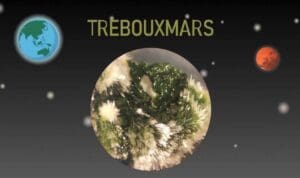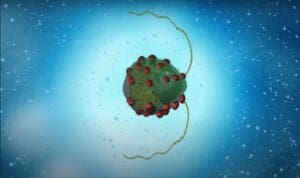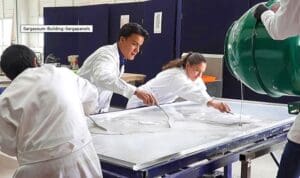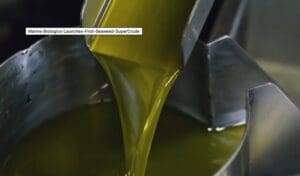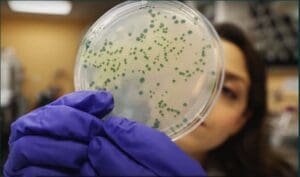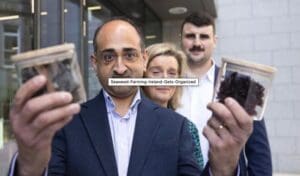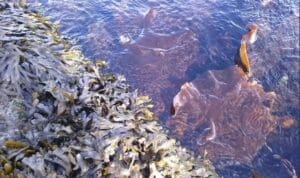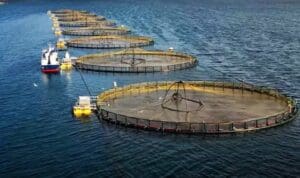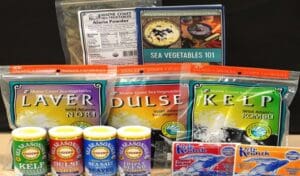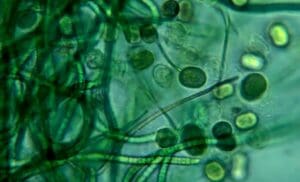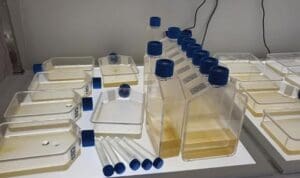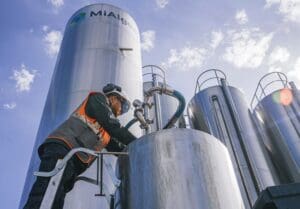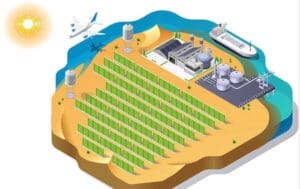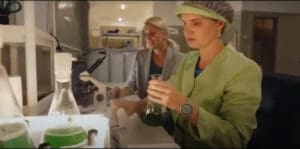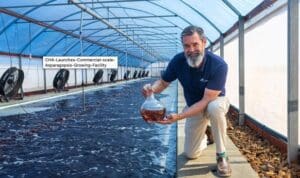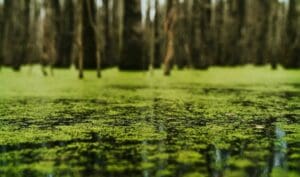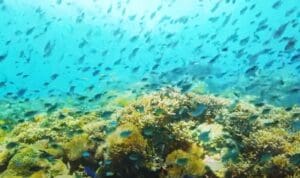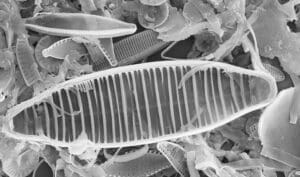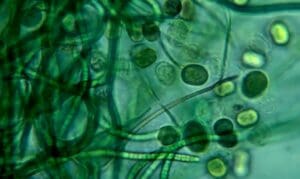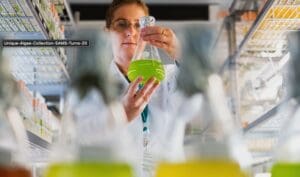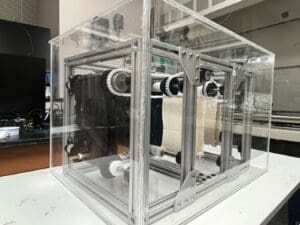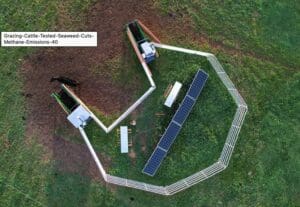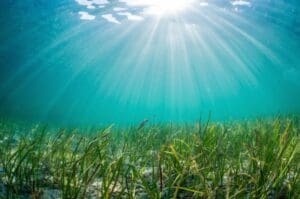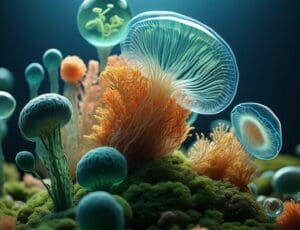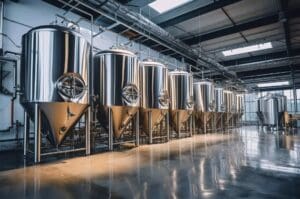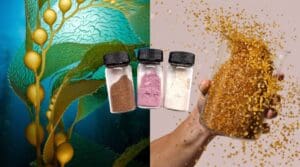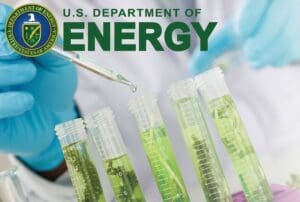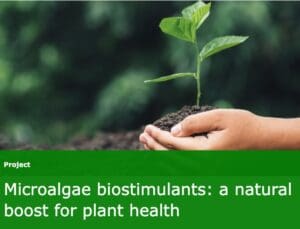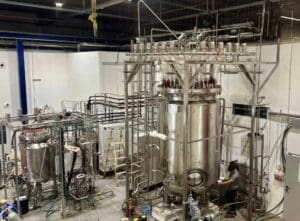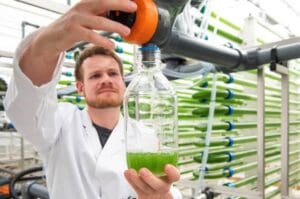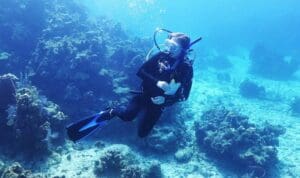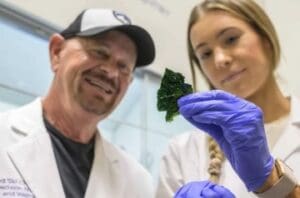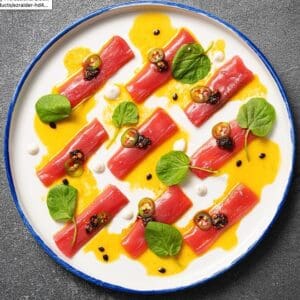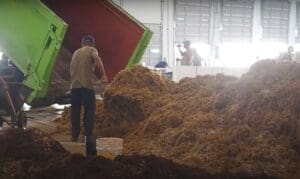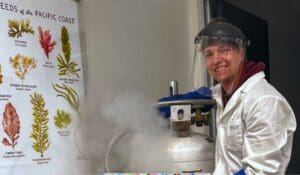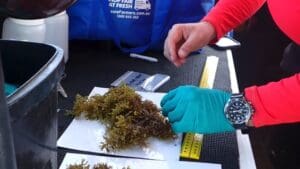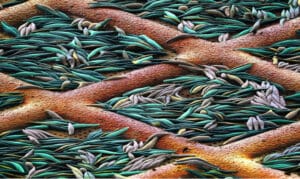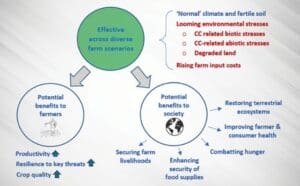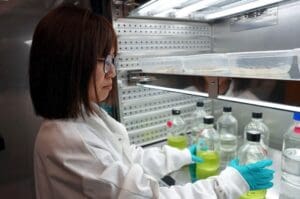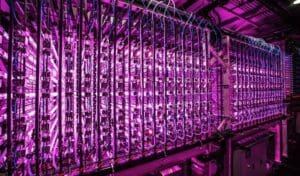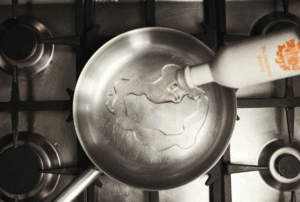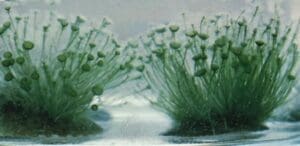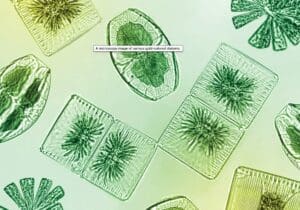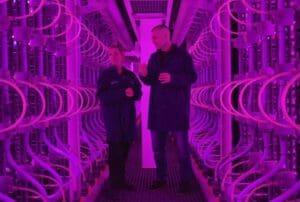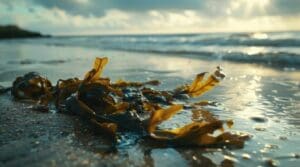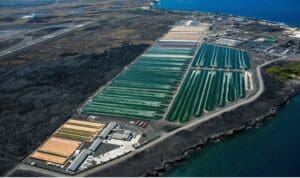BLOGS
Sibiotech Developing Health-promoting Products from Microalgae
By algaeintel.com |
The Latvian biotechnology company Sibiotech (AS Sistēmu inovācijas) has acquired production equipment with €872,000 in financing from SEB Bank to begin extracting omega-3 fatty acids and antioxidants, as well as manufacturing products, from microalgae. Their goal is to offer a healthier and more sustainable alternative to traditional fish-derived omega-3 products — concurrently supporting the development and international competitiveness of…
Read More Earthrise Launches New Spirulina Facility in California
By algaeintel.com |
Earthrise Nutritionals’ outdoor algae cultivation facility, at approximately 190,000 m2, is one of the world’s largest. Complying with California’s stringent food safety regulations, the facility produces 550 tons of Spirulina annually, alongside LINABLUE®, a natural blue food coloring. Powered by over 50% renewable energy and utilizing 1,200 tons of refined CO2 yearly, Earthrise Nutritionals has…
Read More VT Researchers Expand Knowledge of Viral Latency
By algaeintel.com |
Researchers in the Aylward lab at Virginia Tech have discovered a dormant virus in a model green alga and were able to reactivate it and get it to produce variants. This expands the known limits of a giant virus’s ability to lay dormant within the genome without being discovered for so long, and this may have greater…
Read More Stanford Researchers Say Cyanobacteria’s Unusual Enzymes May Boost Carbon Storage
By algaeintel.com |
Stanford researchers have found a group of cyanobacteria with two forms of the enzyme RuBisCo, which could be advantageous for life in low-oxygen ocean waters. If the enzyme combo proves to be a benefit, it may have applications in agriculture. “This is one of those great examples of science where you go out looking for…
Read More Space Algae Experiments in the International Space Station
By algaeintel.com |
NASA’s Synthetic Biology Group engineers biological systems to provide critical resources for space exploration, including food, life support, and materials. Current efforts include Bionutrients, CO2-based manufacturing, Lunar Explorer Instrument for space biology Applications (LEIA), and Space Algae. Understanding the genomic impacts on microalgae after growth in the International Space Station, plants and microbes can be used…
Read More MiAlgae Planning New Production Facility in Scotland
By algaeintel.com |
iotech pioneering firm MiAlgae has marked a major step forward in its mission to increase production volumes of its sustainable biotechnology solutions, as it recently announced plans for a new production facility in Grangemouth, Scotland. Supporting Scotland’s green economic transition, the first phase of the site is estimated to create over 100 green jobs. The planned expansion…
Read More Exploring Kelp Extracts for Soil Health and Crop Resilience
By algaeintel.com |
A project is underway to explore how kelp extracts can enhance nutrient management in agriculture, backed by Innovate UK funding and a coalition of industry experts. The project, titled “Assessing Sugar Kelp Extracts as a Nutrient Management Tool” (SKE-NMT), is spearheaded by Algapelago Marine Ltd. in collaboration with The James Hutton Institute, Atlantic Mariculture Ltd and the UK Agri-Tech…
Read More Extracting Biostimulants from Macroalgae
By algaeintel.com |
Marine Dehail works as project manager for ALGAIA, in France. She specializes in the development of novel algae-based products. For the EU research project LOCALITY, she extracts valuable ingredients from dried macroalgae. These extracts act as biostimulants to help plants cope with environmental stresses such as salt or water stress. Partners in the LOCALITY project are…
Read More AI-Driven Algae Biofactories
By algaeintel.com |
In this video from EcoInnovaTech, we explore how algae biofactories are transforming into powerful carbon-capturing machines and developing sustainable fuel sources. With the help of AI, labs and startups around the world are now turning microalgae into biofuels, bioplastics, and much more. Think of algae as tiny biofuel factories, powered by solar energy and capturing carbon…
Read More SequestStar Turning Microalgae into Calcium Carbonate
By algaeintel.com |
In this video University of Maryland Center for Environmental Science (UMCES) Professor Elizabeth North and her research team, SequestStar, discuss sequestering carbon dioxide from the atmosphere, using microalgae, and turning it into calcium carbonate. “The idea for this process came about when I was doom scrolling when my son was two years old,” she says. “I…
Read More EU4Algae Publishes Report on Regenerative Ocean Farming
By algaeintel.com |
The report focuses on compiling information, developing a business case, and drafting key recommendations to support the sector’s evolution. It outlines strategic recommendations and a structured EU framework for deploying algae-based carbon and nutrient sequestration initiatives, such as marine permaculture projects. Specifically, it includes: By delivering these insights, the publication aims to foster a more resilient…
Read More Wastewater Treatment’s ADBA Model for Algae-Bacteria Interactions
By algaeintel.com |
Microalgae have emerged as a promising solution for wastewater treatment due to their high metabolic efficiency and ability to utilize nutrients. However, large-scale algal cultivation faces challenges such as high production costs and the need for freshwater. A new study published in the Journal of Bioresources and Bioproducts presents an ADBA model that addresses these challenges by optimizing algal…
Read More Growing Trebouxiaceae Algae on Mars
By algaeintel.com |
It’s a long way to Mars, and explorers headed there will either have to take enough food and supplies to last the whole trip or use in-situ resources to make what they need. A recent ESA Discovery project led by the Universitat de València explored whether microalgae extracted from lichen — Trebouxiaceae — could survive…
Read More Magnetic Microalgae on a Mission
By algaeintel.com |
Scientists at the Max Planck Institute for Intelligent Systems have coated a single-celled green microalga with a magnetic material and created a magnetic microalgae robot. In nature, the ten-micrometers small algae are fantastic swimmers, propelled by their two whip-like flagella at the front. The scientists found that the microrobots maintained their swimming speed after magnetization,…
Read More UNAM Scientists Develop Construction Panels from Sargassum
By algaeintel.com |
What if a tourism-wrecking blight of unwanted macroalgae in the Caribbean could be repurposed into a valuable building resource, such as construction panels? Taking it a step further, what if it could be developed with a high resistance to bending, fire, and had good thermal insulation properties? This is exactly what is in development at…
Read More SusAlgaeFuel Project Eyes Environmentally Friendly Aviation Fuel
By algaeintel.com |
Is algae oil the future of aviation? Discover how scientists are revolutionizing air travel with sustainable jet fuel made from microalgae. In this video from the European Science Communication Institute, we visit the EU researchers on the SusAlgaeFuel project, exploring innovative solutions to create environmentally friendly aviation fuel and significantly reduce the carbon footprint of flying. Join…
Read More Marine Biologics Launches First Seaweed SuperCrude
By algaeintel.com |
Biomaterials company Marine Biologics has launched SuperCrude™, described as the world’s first programmable biomass. Designed from seaweed to work with the company’s open-source cheminformatics models, SuperCrude enables customers to develop new compounds for next-generation innovations. The first commercial SuperCrude product supports the creation of natural emulsifiers for clean-label products across industries. Future versions for bioactives and proteins…
Read More A Chemistry Professor Discusses Microalgae Biomanufacturing
By algaeintel.com |
Professor Valerie Ward, Associate Professor of Chemical Engineering and director of the Microalgae Biomanufacturing Lab at the University of Waterloo, a public research university in Ontario, Canada, talks about her biomedical and biotech research interests. Ward is engaged with microalgae biomanufacturing using biological processes to manufacture products like antibiotics or proteins for pharmaceutical applications. “Biomanufacturing…
Read More Seaweed Farming in Ireland Gets Organized
By algaeintel.com |
The untapped potential of seaweed farming in Ireland is the focus of the new Irish Seaweed Association, launched at an event at Trinity College, in Dublin, on February 28, 2025. Inspired by the Norwegian Seaweed Association model, the Irish Seaweed Association intends to unite industry stakeholders, policymakers, and researchers to unlock the potential of seaweed…
Read More Fermented Seaweed Could Boost Consumption
By algaeintel.com |
Fermented seaweed? Those who have tried it think it is much tastier than it sounds, and researchers in Sweden are now hoping that acidified seaweed, rather than today’s dried version, will signify a breakthrough for seaweed as a food source. Biotechnology researchers at Lund University have been experimenting with treating fresh seaweed with lactic acid bacteria (fermenting…
Read More Omega-3: The Ultimate Circular Crop?
By algaeintel.com |
Traditionally big-farmed fish like salmon obtain their necessary omega-3 through consuming fish meal made of small oily fish, like anchovies. These small fish are wild caught, accounting for around 20% of all wild fishing — the majority of which could be eaten by people directly. And so, fish farming like this puts great strain on…
Read More USDA Partners with Maine Kelp Producers on Resilient Food Systems
By algaeintel.com |
The U.S. Department of Agriculture’s (USDA) Agricultural Marketing Service (AMS) has partnered with Maine to award nearly $1 million for five projects through the Resilient Food Systems Infrastructure Program (RFSI) to build resilience across the middle of the supply chain and strengthen local and regional food systems. “Projects funded through the Resilient Food Systems Infrastructure program are…
Read More Concordia Team Studies Algae for Carbon-Negative Clean Energy
By algaeintel.com |
Jack Aylmer, Energy Correspondent for Straight Arrow News, reported in 2024 that a study conducted by researchers at Concordia University developed an innovative method to generate clean energy using algae. To harness the power of photosynthesis, the team created micro photosynthetic power cells capable of capturing electrons produced during this natural process and converting them into…
Read More The Need for Smart Microalgal Bioprospecting
By algaeintel.com |
New research has highlighted microalgae’s capacity as a solution in the fight against climate change, but researchers warn that “smart microalgal bioprospecting” is needed to unlock its full potential. The study highlights the vast, largely unexplored capacity of microalgae to mitigate CO₂ emissions while driving sustainable industry. “Microalgae have remarkable properties that make them an ideal…
Read More MiAlgae Building Production Facility for Omega-3
By algaeintel.com |
MiAlgae, a biotechnology innovator based in Edinburgh, Scotland, has successfully reached commercial-scale of its sustainable marine omega-3 product, NaturAlgae, at its demonstration site in Scotland. The company has subsequently announced securing £14 million ($15.6 million USD) in funding to accelerate its operations and scale production. The 2023 launch of MiAlgae’s demonstration site has proven the…
Read More HutanBio Takes a New Approach to Algal Biofuels
By algaeintel.com |
For decades, the promise of algal biofuel has remained tantalisingly out of reach. Despite significant investment from major oil companies, the industry has faced persistent challenges: unstable algae populations, prohibitive infrastructure costs, and insufficient oil yields. While many consider algal biofuel the industry’s cautionary tale, the research team at HutanBio, in England, decided to take…
Read More SpirulinaNord Producing Fresh Spirulina in Latvia
By algaeintel.com |
In the town of Riga, a small Latvian company named SpirulinaNord found an innovative way to produce spirulina as a desirable ingredient. The company employs a closed system approach to growing fresh microalgae. Then they mix their “Daily Harvest” with local organic juices and sells them as good tasting, healthy drinks, and syrups in their…
Read More CH4 Launches Commercial-Scale Asparagopsis Growing Facility
By algaeintel.com |
CH4 Global has announced that it has begun production at the world’s first commercial-scale facility for growing Asparagopsis, marking a major step forward in making seaweed-based methane reduction accessible and economically viable for the global livestock industry. CH4 Global’s EcoPark facility, which formally opened January 29, 2025 in Louth Bay, South Australia, represents a breakthrough…
Read More Could this Freshwater Alga be the Next Superfood?
By algaeintel.com |
A green freshwater alga that grows in lakes and rivers could be the next “superfood” — helping scientists to tackle global food security challenges while promoting environmental sustainability, a new study suggests. Chlorella Vulgaris is a freshwater microalga rich in protein, lipids, carbohydrates, vitamins, and minerals. Unlike conventional agriculture, which requires extensive land and water…
Read More EFSA Says Schizochytrium Limacinum Microalgae Oil Can Be Safely Used in Infant Formula
By algaeintel.com |
The European Food Safety Authority (EFSA) has concluded that oil derived from the microalgae Schizochytrium limacinum (strain ATCC-20889) is safe for use in infant and follow-on formulas at DHA concentrations of 20–50 milligrams per 100 kilocalories. Infant formulas in the EU are required to contain DHA, an omega-3 fatty acid important for brain and retinal development. The microalgae oil…
Read More Is Seaweed Farming the Future in the Philippines?
By algaeintel.com |
People in the Philippines have a very strong spiritual connection with the ocean, it’s at the heart of their culture. But climate change is impacting their relationship with the ocean. They are finding they need a new way for people to be able to live sustainably alongside the ocean and benefit from all the services…
Read More Polluted Water Purification Using Diatoms
By algaeintel.com |
Researchers at the University of Duisburg-Essen, in North Rhine-Westphalia, Germany, have developed a new method for polluted water purification using algae. Their recent study demonstrates that the fossil remains of diatoms (a type of algae) can efficiently remove contaminants from water after being chemically modified. Europe’s water bodies are in poor condition: more than half…
Read More Oceanfoam Becomes Carbon Positive
By algaeintel.com |
Oceanfoam, an active lifestyle brand committed to sustainability, has achieved a carbon positive status going into 2025, according to the company. A newcomer in the fitness and wellness industry, the company’s intention is to revolutionize the fitness industry and help the planet, by making a significant environmental impact and raising awareness. The company designs fitness…
Read More Concordia University team uses algae for carbon-negative clean energy solution
By algaeintel.com |
A recent study conducted by researchers at Concordia University developed an innovative method to generate clean energy using algae. In order to harness the power of photosynthesis, the team created micro photosynthetic power cells capable of capturing electrons produced during this natural process and converting them into a continuous electric current. https://algaeplanet.com/best-of-24-concordia-team-studies-algae-for-carbon-negative-clean-energy/?utm_source=mailpoet&utm_medium=email&utm_source_platform=mailpoet&utm_campaign=none
Read More Unique Algae Collection at SAMS Turns 20
By algaeintel.com |
A unique algae collection of microscopic marine and freshwater species that began a century ago has nearly doubled in size in the 20 years it has been based at the Scottish Association for Marine Science (SAMS) in Oban. The Culture Collection of Algae and Protozoa (CCAP) is one of the world’s most biodiverse collections, looking…
Read More Researchers earn $2.5 million Department of Energy grant to convert polluted waste into aquafeed
By algaeintel.com |
Peter He and a team of researchers are developing novel technology that converts pulp and paper mill flue gas (carbon emissions) and aquaculture wastewater into algae-based protein for aquafeed pellets. In short, they’re turning pollution into fish food. https://eng.auburn.edu/news/2024/12/researchers-earn-doe-grant-to-convert-polluted-waste-into-aquafeed
Read More Feeding Grazing Cattle Seaweed Cuts Methane Emissions by Almost 40%
By algaeintel.com |
Seaweed is once again showing promise for making cattle farming more sustainable. A new study by researchers at the University of California, Davis, found that feeding grazing beef cattle a seaweed supplement in pellet form reduced their methane emissions by almost 40% without affecting their health or weight. The study was published today (Dec. 2) in Proceedings…
Read More When marine algae get sick: how viruses shape microbe interactions
By algaeintel.com |
By looking at the tiniest virus-infected microbes in the ocean, researchers are gaining new insights about the marine food web that may help improve future climate change predictions. The new study, co-authored by Wake Forest Assistant Professor of Biology Sheri Floge, brings together viral ecologists, chemists and physicists to find out more about marine microbes and…
Read More A Brief History of Algae
By algaeintel.com |
Algae are a vast group of photosynthetic organisms, ranging from microscopic species (microalgae) like chlorella and phytoplankton, to large multicellular species (macroalgae) like kelp and seaweed. The history of algae stretches back billions of years, as these diverse, simple organisms have played an essential role in shaping Earth’s environment and biological evolution. https://algaeplanet.com/a-brief-history-of-algae/?utm_source=mailpoet&utm_medium=email&utm_source_platform=mailpoet&utm_campaign=none
Read More How Hydrosome Labs is Transforming Fermentation with Ultrafine Bubble Technology
By algaeintel.com |
In the world of advanced science and technology, breakthroughs often come from unexpected places. For Hydrosome Labs, the game-changer is ultrafine bubbles—or nanobubbles—an innovation poised to reshape fermentation processes across industries like brewing, biopharma, and precision fermentation.
Read More Seaweed Innovators Sway and Umaro Join Forces to Optimize Alginate for Sustainable Bioplastics
By algaeintel.com |
Berkeley, CA – Bay Area-based seaweed innovation startups Umaro and Sway have been awarded a Department of Energy (DOE) Mixed Algae Conversion Research Opportunity (MACRO) grant of $1,500,000 to innovate new processing techniques that upcycle alginate sidestreams from Umaro’s seaweed protein production into Sway’s seaweed-based bioplastics. https://swaythefuture.com/press-release-macro-grant
Read More BETO: $20.2 Million to Develop Algae for Biofuels and Bioproducts
By algaeintel.com |
The U.S. Department of Energy’s Bioenergy Technologies Office (BETO) and Office of Fossil Energy and Carbon Management (FECM) have announced $20.2 million in funding for 10 university and industry projects to advance mixed algae development for low-carbon biofuels and bioproducts. Located in seven states, these selected projects will address high-impact research and development focused on converting algae, such as…
Read More Microalgae biostimulants: a natural boost for plant health
By algaeintel.com |
Biostimulants are substances that improve plant health by enhancing metabolic and physiological mechanisms such as nutrient uptake and tolerance to environmental stresses. Diverse microalgae species have become an attractive source of biomass due to their several organic compounds with biostimulant activity. The composition of these biostimulants can vary depending on microalgae species and its growth…
Read More Brevel Launches FOAK Facility to Demonstrate Microalgae Protein Fermentation at Commercial Scale
By algaeintel.com |
Israel’s Brevel, a biomass fermentation startup producing microalgae proteins, announces that it has completed the construction of its demonstration facility and secured two commercial agreements with leading F&B companies. The startup inaugurated a new site in Southern Israel this June, featuring headquarters, R&D space, and proprietary industrial-scale fermenters. The facility has been designed to implement a First-Of-A-Kind (FOAK) strategy…
Read More Microalgae: Chlorella Growth Factor and Galdieria Sulphuraria Promise High Quality Proteins for a Hungry World
By algaeintel.com |
Today, we bring two microalgae innovations unlocking an alternative protein source with remarkable nutritional and sustainability benefits for the growing population. Microalgae used for protein production have a higher yield than crops such as soybeans and wheat, and use less water and land. They are considered an ideal source for producing nutritious and digestible food in the future when climate change…
Read More UTA Studies Immune Health of Algae-Jellyfish Relationship
By algaeintel.com |
A new University of Texas, Arlington (UTA) study on the algae-jellyfish relationship has implications for both humans and coral reefs. Marine animals like jellyfish, corals, and sea anemones often live with algae inside their cells in a symbiotic relationship. The animals give the algae nutrients a place to live; in return, algae give the animals…
Read More Exploring a microbial solution to food insecurity
By algaeintel.com |
“We are facing an existential crisis,” said Chilton, who is a professor and the director of the Center for Precision Nutrition and Wellness in the School of Nutritional Sciences and Wellness at the College of Agriculture, Life and Environmental Sciences. “The world population will be around 10 billion people by 2050. That means we need to increase food production to feed…
Read More Aqua Cultured Foods earns regulatory approval in US for fermentation-based fish-free seafood
By algaeintel.com |
Chicago, US-based alt-seafood start-up Aqua Cultured Foods has obtained self-GRAS status in the US, following a recent review by an independent panel of qualified scientific and toxicology experts. GRAS independent conclusion gives Aqua the green light to sell its products to consumers in the US. Aqua’s first products – tuna and scallops – are made…
Read More From ‘seaweed emergency’ to sustainable solutions
By algaeintel.com |
There’s a problem piling up on the shores of Mexico’s famous Yucatan Peninsula. Since 2011, a brown seaweed called sargassum has been drifting onto the popular beaches of Quintana Roo. In 2019, it got so bad that local officials declared a ‘seaweed emergency’. The unprecedented recent influx of Sargassum seaweed on coastal shores demonstrates…
Read More Blue Evolution and Blu3 Merge for Sustainable Seaweed Expansion
By algaeintel.com |
Blue Evolution Inc., an innovator of regenerative blue biotechnology, and Blu3 Inc., a company that specializes in regenerative ocean technologies, have announced their merger. This strategic move creates a vertically integrated company with expertise in seaweed farming, bioproduct development, and market-ready applications across food, agriculture, biomaterials, and critical minerals. https://www.einpresswire.com/article/754392161/blue-evolution-and-blu3-merge-to-drive-industry-leadership-in-sustainable-seaweed-innovation
Read More Seaweed nutrients mapped to explore carbon capture potential
By algaeintel.com |
AIMS scientists have completed the first in a series of planned field trips to Western Australia’s tropical seaweed meadows to understand the nutrient levels required to maximise growth of Sargassum (a common tropical seaweed). The trip was part of the Blue Carbon Seascapes project to find out if Sargassum can provide a nature-based solution to help reduce climate change impacts by…
Read More New discovery reveals how diatoms capture CO2 so effectively
By algaeintel.com |
Tiny diatoms in the ocean are masters at capturing carbon dioxide (CO₂) from the environment. They fix up to 20 percent of the Earth’s CO₂. Prof. Ben Engel’s team at the Biozentrum of the University of Basel has now discovered a protein shell in these algae that is necessary for efficient CO₂ fixation. This groundbreaking…
Read More Researchers Report Promising Findings on Microalgae for Crop Support; Study Ongoing in Malta and Kenya
By algaeintel.com |
Research by a team at University of Malta’s Institute of Earth Systems is looking at how microalgal inputs might offer options to support agricultural production, including both crop support and livestock support. The evidence summarised by their new academic paper, Microalgae-Based Crop Support Technologies Show Multifaceted Promise Well-Suited to Looming Threats, suggests great technological potential for…
Read More Innovative Algae Technologies Help UConn Teams Advance in National Competition
By algaeintel.com |
UConn students and faculty are taking two teams to the final for the U.S. Department of Energy’s AlgaePrize competition. The interdisciplinary teams will develop sustainable, algae-based products for use as a poultry feed supplement and food preservative.
Read More Breakthrough study unveils sustainable solution to vitamin B12 deficiency
By algaeintel.com |
In new research published in the scientific journal Discover Food, Dr. Asaf Tzachor, Founder and Academic Director of the Aviram Sustainability and Climate Program at Reichman University, along with a team of researchers from Iceland, Denmark and Austria, report the use of state-of-the-art biotechnology to cultivate photosynthetically-controlled Spirulina, and produce carbon–neutral and nutritious biomass containing…
Read More Algae Cooking Club: Omega-9 Packed Microalgae Oil with Superior Sustainability and Smoke Point
By algaeintel.com |
Using the power of fermentation, the US startup Algae Cooking Club produces, in just three days, a chef-grade cooking oil derived from microalgae using significantly fewer resources and emitting less carbon than traditional vegetable oils. Algae Cooking Club: Omega-9 Packed Microalgae Oil with Superior Sustainability and Smoke Point
Read More National Algae Association Expands Algae Production Incubator Program
By algaeintel.com |
The National Algae Association (NAA) continues to foster collaboration between academia and the algae industry through its Algae Production Incubator Program. The initiative aims to lower risks for algae startup companies while providing valuable training opportunities for microbiology students. National Algae Association Expands Algae Production Incubator Program
Read More Algae Summary
By algaeintel.com |
Algae, members of a group of predominantly aquatic photosynthetic organisms of the kingdom Protista. Algae have many types of life cycles, and they range in size from microscopic Micromonas species to giant kelps that reach 60 metres (200 feet) in length. Their photosynthetic pigments are more varied than those of plants, and their cells have features not found among plants and animals. In addition…
Read More Better Living Through Algae Biotechnology
By algaeintel.com |
At present, Earth is the only planet known to be capable of supporting life. But despite the fact that humanity cannot reasonably exist anywhere else, the way that humans currently live on this planet is simply not sustainable in the long term. From resource-intensive agriculture and pollution to climate change and global biodiversity loss, humans must fundamentally alter…
Read More Iceland’s Vertical Farm Turning Algae into Food
By algaeintel.com |
Wth short summers, a cold climate, and a landscape of lava fields and glaciers, Iceland’s not the first place you’d link with food production. But pioneering entrepreneurs are growing some surprising crops and doing it sustainably. BBC News shares this video of farming innovation using green energy to produce fresh produce in a cold climate.…
Read More Exploring Sargassum Storage for Biofuel Conversion
By algaeintel.com |
Sargassum mats piled up on beaches release hydrogen sulfide as they decompose. The gas smells like rotten eggs; it can irritate the eyes, nose, and throat and have a negative impact on tourism, the primary economic driver in many locations. The mats must then be removed, often by hand, where they go to landfills and…
Read More Algae-Based Food Goes Global: Scaling Up Marine Aquaculture
By algaeintel.com |
While terrestrial agriculture has long provided the backbone of the world’s food production system, a new opinion article makes the case for increased investment in algae-based food and aquaculture systems as a means of meeting nutritional needs while reducing the ecological footprint of food production. https://journals.plos.org/plosbiology/article?id=10.1371/journal.pbio.300182
Read More 
